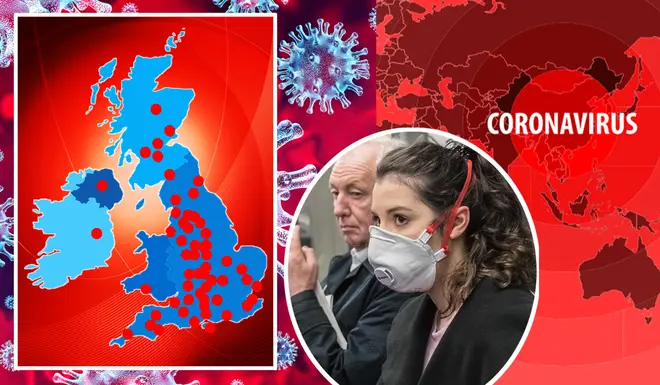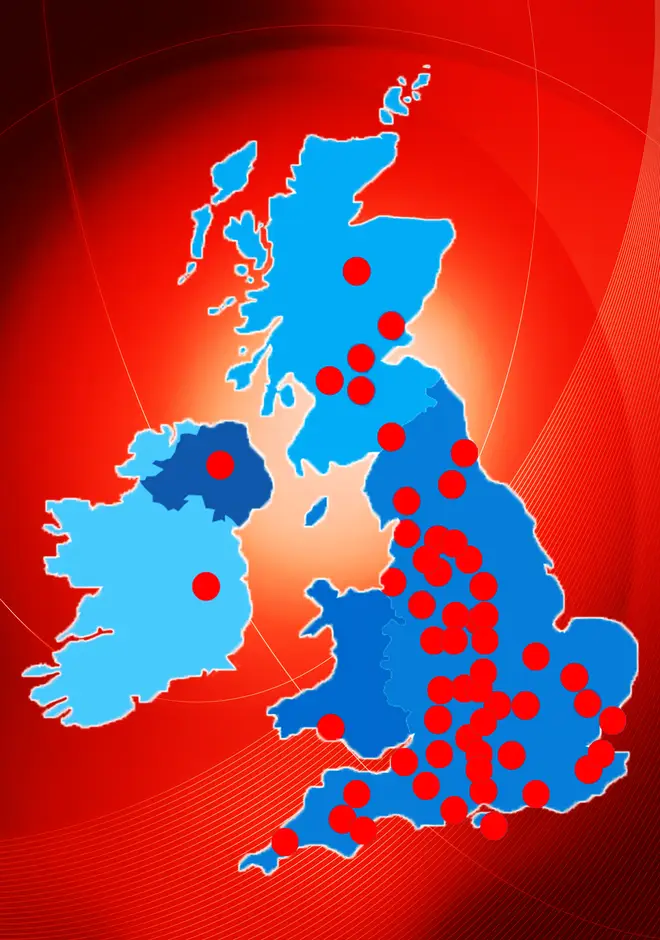Coronavirus UK map: Where in Britain are the confirmed COVID-19 cases as cases rise to 165,221?
24 April 2020, 14:19 | Updated: 29 April 2020, 17:05

Cases of coronavirus in the UK has risen to 165,221 as of April 29, but where in the UK has the virus spread to?
As of Monday April 29, there are 165,221 confirmed cases of coronavirus in the UK.
There have now been a total of 26,097 deaths in the UK due to the COVID-19 outbreak.
Prime Minister Boris Johnson put the UK in lockdown three weeks ago now, and more recently the Government have announced the lockdown will continue for another three weeks as they await the peak.
READ MORE: Nurse warns having long nails is one of the fastest spreaders of coronavirus
So far, we know of confirmed cases in areas across Britain from Sheffield, Manchester and Liverpool to London, Hertfordshire and Surrey.
Here's all the details:
Where are all the confirmed cases in the UK? A map:

While some locations of cases of coronavirus have not been published, we know of some areas in the UK people have been confirmed with the deadly bug.
Some areas have been pinpointed to specific locations, while others are more vague and could cover a larger area.
These are:
Grampian, Scotland
Ayrshire, Scotland
Sheffield
Greater Manchester
Carlisle
Wirral
Bury
Bolton
Kent
Hertfordshire
Devon
Gloucestershire
Berkshire
Surrey
West Sussex
Yorkshire
Wales
Republic of Ireland
Northern Ireland
Cumbria
Cheshire
Dundee
Derbyshire
Essex
Glasgow & Clyde
Lancashire
Barnet
Barnsley
Birmingham
Bournemouth, Christchurch and Poole
Bracknell Forest
Bradford
Brighton and Hove
Bristol
Bromley
Buckinghamshire
Cornwall
Coventry
Ealing
Hampshire
Hillingdon
Isle of Wight
Lambeth
Leeds
Leicestershire
Liverpool
Luton
Manchester
Medway
Milton Keynes
Newcastle
North Tyneside
Northamptonshire
Nottingham
Oldham
Oxfordshire
Peterborough
Redbridge
Somerset
Southend-on-sea
Staffordshire
Swindon
Tameside
Torbay
Tower Hamlets
Trafford
Warwickshire
Wigan
Wiltshire
Wokingham

What's the latest on the coronavirus in the UK?
On April 29, it was announced that the total confirmed cases of coronavirus had risen to 165,221.
The death toll is now at 26,097 in Britain.
Prime Minister Boris Johnson announced the UK was going into lockdown three weeks ago now, meaning the public are only allowed out for essential trips to the supermarket, to collect medicine and for one form of exercise a day.
The Government announced new and stricter rules for the public in order to stop the spread of coronavirus, and in turn ease the pressure on the NHS.
Boris Johnson explained in the press conference: "If too many people become seriously unwell at one time, the NHS will be unable to handle it, meaning more people are likely to die. Not just from coronavirus, but from other illnesses as well."
Most recently, the Government announced that they will be extending the lockdown period for another three weeks.
In a press conference on Thursday April 16, Dominic Raab said that while there are indications the lockdown has been successful in slowing down the spread of the virus, it is still a mixed and inconsistent picture.
Due to this, the UK will continue it's lockdown for another three weeks. He warned that by relaxing the lockdown and social distancing rules too early, it could cause a second peak of the virus and would "undo all the process we've made". The Foreign Secretary explained that if they were to relax the social distancing rules now, it would damage public health and the economy.
READ MORE: Coronavirus UK lockdown: When can I leave the house and what for?

READ NOW: Supermarket lockdown rules: Can I pay cash and what are the opening times?































